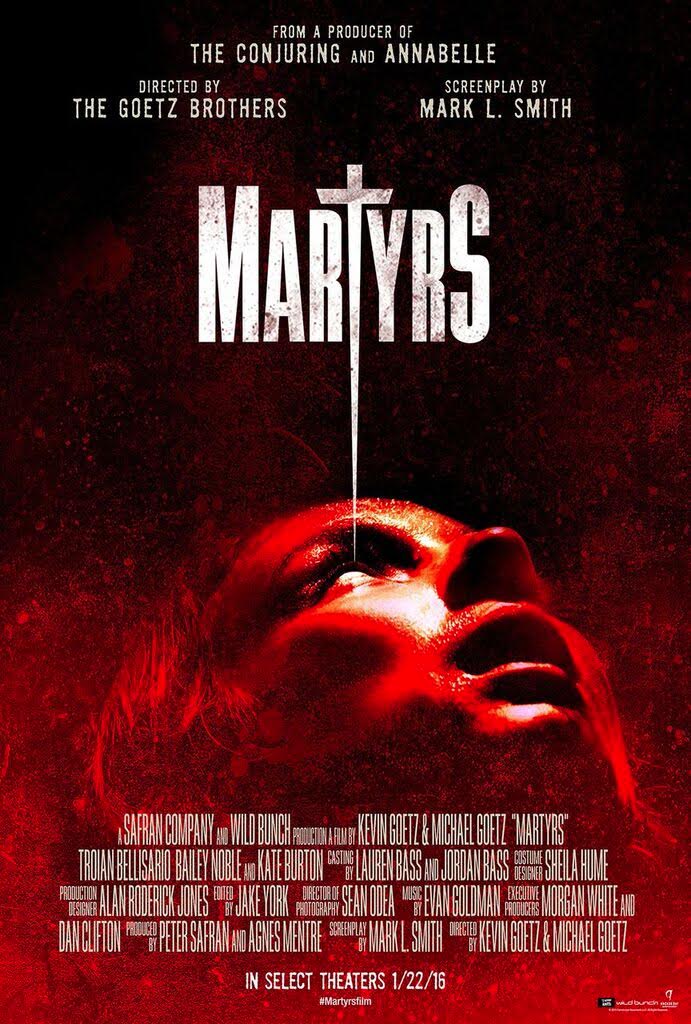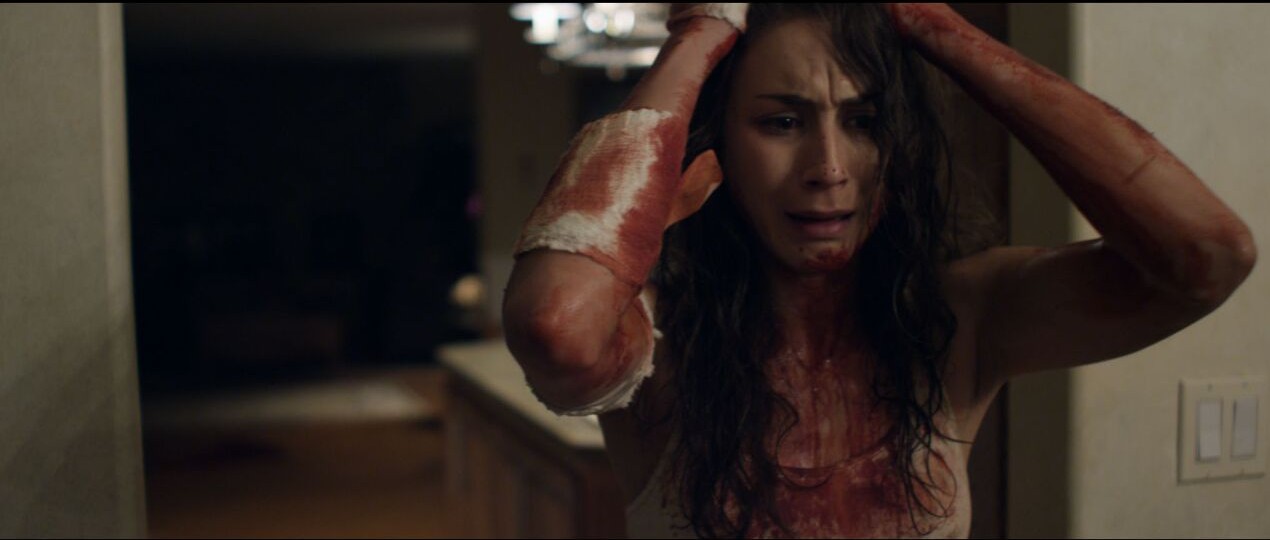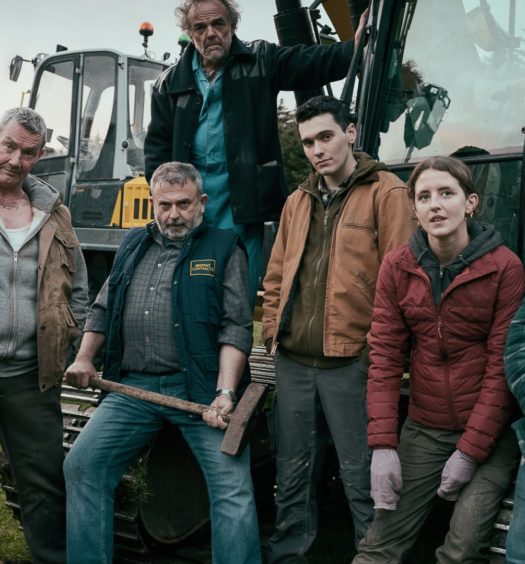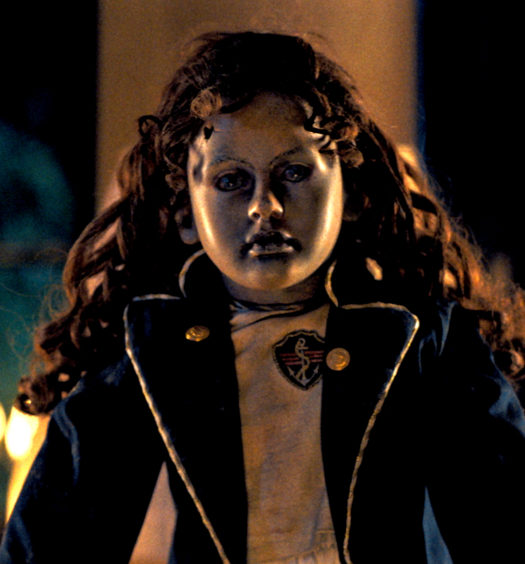Editor’s Note: The Martyrs remake seems to me aimed at an audience that knows nothing of the now classic French film. To give this version the fairest possible review, we combed the MH staff for a writer that hadn’t seen the original. Spencer wasn’t too embarrassed to admit that he slept on Martyrs, and his fresh eyes will prevent this review from getting bogged down in the “is it true to the original” bullshit and allow it to function as a discussion of the film’s merits and weaknesses.
I’m not quite sure what to make of Martyrs. It has some wonderful horror filmmaking behind it, but the script has such massive third-act problems that in hindsight it dramatically hobbles the film. It’s a shame, because Martyrs starts strong, trucks along magnificently for two acts, and falls flat on its face. Having not seen the original, I suspect the problems here aren’t artifacts of translation; they’re baked into the script and film as a whole. Ultimately, I don’t think Martyrs knows what it wants to be or how to get us there, but mostly everything that it tries to be along the way is a hell of a lot of gross fun.
Plot descriptions of horror movies never really get at what actually happens in the film, and that’s actually my biggest gripe with Martyrs. Here’s the ostensible set-up: Anna, as a child, escapes from some sort of ineffable torture. Tormented by monsters and stuck in a Catholic orphanage (starting off scary already!), Anna befriends Lucy, who can reach through her shroud of psychological pain and night terrors. The movie introduces the concept of Anna’s “monsters” very quickly, and the film plays with whether or not there is a supernatural aspect to Anna’s trauma for the majority of its running time.
The movie jumps ten years after building up the girls’ friendship at the orphanage, and we learn Anna has dedicated herself to finding those who tortured her and getting her revenge. Unfortunately for us as viewers, getting her revenge only takes a few minutes, and we spend the majority of the film watching the girls pick up the pieces. Anna’s mental state deteriorates, and Lucy starts to doubt whether her friend is sane, all while the monsters stalk around to the point of physically assaulting Anna when she’s alone. These first two acts, when the film hasn’t answered its dangling questions and just lets the characters deal with this ridiculous situation they find themselves in, are a treat. They’re tense, you’re invested in the characters, and you feel utterly driven to find out what is really going on. The film has this incredible kinetic feel to it: there’s a consistent feeling of motion driven by pans, tracking shots, and clever sequences of shot selections. The audience moves with the characters and the camera moves with their actions in a direct way that engaged me with the events onscreen. There are also some fantastic birds-eye shots that break up the visual plane of the film in a beautiful way: look for one in the first monster scene in the orphanage and then during a key kill in the house rampage.
Martyrs offers some dreamlike visuals: the opening scenes have the high-lit, washed-out yellow feel of a summer daydream, and brings back scenes of soft sunlight for important transitions. The film, even while depicting precise torture, always retains a human sense of warmth. Lucy’s character, as both the audience surrogate and her own character, gives the film a relatable touch that keeps Martyrs from nihilism. However, the film ultimately betrays Anna’s character. The film takes away her agency for the third act, which feels unsatisfying since you’ve been wondering how she’ll succeed in getting her revenge the whole film. Essentially, the film only gives Anna this trope as far as characterization goes.
But for all the good Martyrs does creating tension and atmosphere, it just doesn’t work as a film. It gives us some deeply unsatisfying answers to the questions it has us all wrapped up in. The answers are given in this truly awful exposition dump by a character we haven’t seen once in the film who is suddenly set up as the villain. The evil monologue doesn’t even sound convincing to the actor speaking the lines, let alone those of us following along at home. It’s a major letdown, and it means that a lot of the emotional work that Martyrs does doesn’t really end up anywhere. The ending calls back to an part of the girls’ developing friendship that would have had real emotional impact if the film didn’t waste all of the audience’s investment on specious plot justification. Martyrs stumbles like Prisoners did a few years ago: fantastic atmosphere ruined by the incursion of reality in the form of ham-handed plot explanations. While often, we finish a horror flick looking to have our questions answered, Martyrs would have been better off leaving us hanging.
Martyrs works, for the most part, but in the end it’s not the film its producers might have wanted it to be. It’s too emotionally unsatisfying to become a hit for American audiences unfamiliar with the original. While it’s well-directed and performed, it doesn’t leave you recommending it to your friends. It leaves you wondering why the screenwriter wanted to go where they went with this material when they were working with so much. What could have been an incredible tale of a girl dragging a friend too deep into revenge somehow becomes this bizarre religious fulfillment exercise. Martyrs has all the promise of a great film, and mostly the execution of a good one, but the sum of its parts adds up to less than one great movie.
Martyrs releases on VOD/DVD/BluRay February 2nd with a limited theatrical release on January 22nd.

Martyrs (2016) [Review]
Flawed
While excellent filmmaking and some intense performances made me want to love Martyrs, it simply fails to deliver the goods in the third act.































